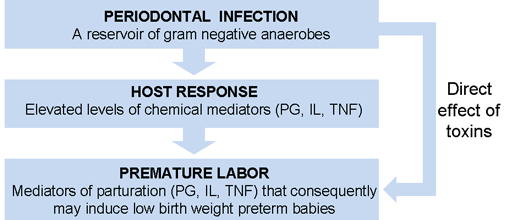The Relationship Between Periodontal Disease and Preterm Birth
Preterm birth is the number one cause of neonatal mortality in the U.S., with substantial cost burdens. If treatment of periodontal disease in pregnant women improved pregnancy outcomes, this would be a significant public health benefit.
Numerous studies have documented an association between maternal periodontal disease and preterm birth and low birth weight. Several studies also demonstrate positive associations between periodontal disease, pre-eclampsia, and gestational diabetes. There are several potential explanations for these associations. Periodontal disease may have direct effects on the uterus through bacteremia causing direct infection of the chorioamnion. However, it is more likely that an indirect mechanism mediated by a systemic inflammatory response occurs.
Bacteremia: Direct Mechanism
- Periodontal infection in the mouth may have direct effects on the uterus through bacteremia causing direct infection of the chorioamnion. Some studies have shown higher rates of periodontal pathogens such as P. gingivalis and F. nucleatum within the placental tissues.
- Immunohistochemical and immunofluorescent stains of placental tissues have been used in some studies to support that colonization, as opposed to mere transient bacterial presence, can occur within the placental tissue.
Systemic Inflammatory Response: Indirect Mechanism
- It is postulated that preterm birth results from a systemic inflammatory response to periodontal infection that increases prostaglandins and interleukins and affects labor initiation.
- Inflammatory response may lead to placental blood flow restrictions, placental necrosis, and consequent low birth weight.
- A similar mechanism has been proposed to explain the association seen between periodontitis and increased rates of heart disease and diabetes.
- RCTs to date have not shown a link between periodontal therapy performed during pregnancy and improved pregnancy outcomes. However, research evaluating periodontal therapy performed prior to pregnancy has not been carried out, and future research is needed to determine whether improvements in periodontitis prior to pregnancy can reduce rates of preterm and low birth weight babies.
Kumar J and Samelson R. Oral Health Care During Pregnancy and Early Childhood: Practice Guidelines.

References
Fischer, LA, Demerath, E, et al. Placental Colonization with Periodontal Pathogens: The Potential Missing Link. American College of Obstetrics and Gynecology, November 2019.
Abariga, SA, Whitcomb, BW. Periodontitis and Gestational Diabetes Mellitus: A Systematic Review and Meta-Analysis Of Observational Studies. BMC Pregnancy and Childbirth. (2016) 16:344.
Vivares-Bulles, AM, Rangel-Rincón, LJ, et al. Gaps in Knowledge About the Association Between Maternal Periodontitis and Adverse Obstetric Outcomes: An Umbrella Review. J Evid Base Dent Pract 2018: [1-27].